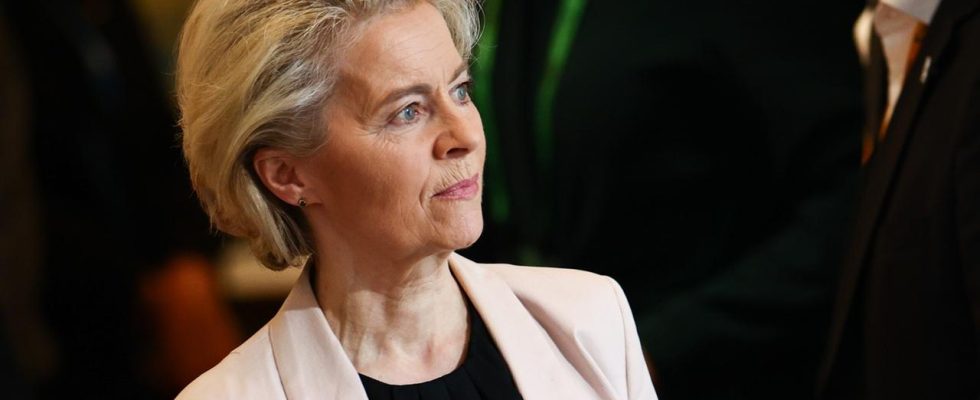Supporters and critics alike praise von der Leyen’s performance as a crisis manager. Today the head of the EU Commission is expected to announce that she is running for a second term in office. This has consequences – for themselves and for Europe.
When Ursula von der Leyen declares her candidacy for a second term at the CDU leadership meeting in Berlin, she slips into a new role: that of campaigner. In 2019 she made it to the top of Europe’s most powerful authority (almost) without a fight. The heads of state and government pushed her through as Commission President against a divided EU Parliament.
This time, von der Leyen will run as the top candidate of the Christian Democratic European People’s Party (EPP). She has the support of party and parliamentary group leader Manfred Weber as well as the chairmen of the CDU and CSU, Friedrich Merz and Markus Söder. The EPP Congress in Bucharest is scheduled to officially nominate her at the beginning of March.
For five years, von der Leyen had to balance and moderate between 27 member states, now she can polarize. She must clearly separate the election campaign and office. Conveniently, the Commission only updated the relevant guidelines a month ago.
support of the member states necessary
Ursula von der Leyen is not the first to run for a second term at the top of the Commission. The Portuguese José Manuel Barroso was president twice, the Frenchman Jacques Delors even three times. In order to be re-elected, she needs the support of EU governments. Twelve of these are run by Christian Democrats and are therefore part of von der Leyen’s political camp.
The traffic light government in Berlin also gives the CDU politician the chance of a second term in office, even though her party is in opposition in the federal government. According to the traffic light coalition agreement, the Greens are allowed to propose an EU Commissioner – but only if the Commission President is not from Germany.
French President Emmanuel Macron also supports her; he finally proposed to her in 2019. Von der Leyen has developed a good relationship with the ultra-right and pragmatic Italian head of government, Georgia Meloni.
Difficult majority in the EU Parliament
In order to remain head of the Commission, she also needs a majority in the EU Parliament. In July 2019, von der Leyen only received nine more votes than necessary; Members of the SPD and the German Greens did not vote for her. This time too it will be difficult if the right-wing factions make gains in the European elections. In the election campaign, von der Leyen must first close his own ranks. The EPP group has recently no longer unconditionally supported its “Green Deal” for the sustainable restructuring of Europe and has blocked important environmental laws. MPs complain that the head of the Commission is not showing herself enough and is pursuing green climate policy.
Von der Leyen has been trying to counteract this impression for months. In September, in her State of the Union address, she announced a dialogue with farmers and made concessions to them. Brussels is therefore abandoning its plan to drastically restrict the use of agricultural poisons. Her deputy, Frans Timmermans, who is responsible for climate policy, was replaced by successors who were more rhetorically supple.
What she accomplished
Supporters and critics alike praise von der Leyen’s performance as a crisis manager. The Commission has grown in power and influence under her leadership. During the corona pandemic, the member states commissioned the Commission to procure vaccines. The vaccination campaign went well after initial problems – although details about the agreement with the manufacturer Pfizer remain unclear. Brussels distributes the money from the reconstruction fund financed by shared debt.
Since the beginning of the Russian attack on Ukraine, the Commission has been organizing aid for the country and sanctions against Moscow. Von der Leyen coordinates closely with US President Joe Biden – in Washington they have long known which telephone number to reach Europe. During her trips to Kiev, the head of the Commission, despite exuberant appeals for solidarity, always emphasized that EU accession depends on the country’s progress.
In relation to China, she coined the term “de-risking”. The fact that the president is German became very clear when, after the Hamas attack on Israel, she emphasized Israel’s right to self-defense without equally emphatically calling for the protection of civilians. This did not go down well with some governments and some in their agency.
… and what remains to be done
Brussels must continue to ensure financial aid and military support for Ukraine – all the more so since there are doubts about the reliability of the USA. The EU itself was unable to keep its promise to deliver artillery shells to Kiev on time. To change that, member states are spending more on defense and increasing their arms production. The EU Commission could accompany these efforts by appointing a Commissioner for Defense. The incumbent president announced this at the Munich Security Conference at the weekend in the event that she remains in office. If that happens, it will also have to deal further with Hungary over Budapest’s violations of the community’s core values.
And Ursula von der Leyen can push forward with her original plan, which alone is enough for several terms in office: the fight against climate change. Your commission has spelled out in legal form what the EU states had agreed in Paris in 2015 – to limit global warming to 1.5 degrees. Most of these laws have been passed. But the implementation of the “Green Deal” will still demand a lot from governments and the population; Concessions in the election campaign cannot hide this fact. If von der Leyen stays in office, she can implement what she initiated. She’s not finished yet.
Jakob Mayr, ARD Brussels, tagesschau, February 19, 2024 6:25 a.m

